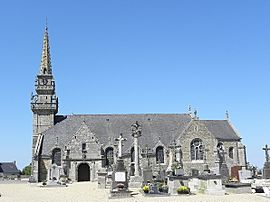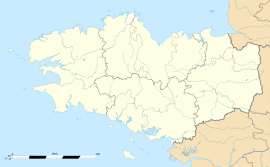Plougoulm facts for kids
Quick facts for kids
Plougoulm
Plougouloum
|
||
|---|---|---|
 |
||
|
||
| Country | France | |
| Region | Brittany | |
| Department | Finistère | |
| Arrondissement | Morlaix | |
| Canton | Saint-Pol-de-Léon | |
| Intercommunality | Pays Léonard | |
| Area
1
|
18.37 km2 (7.09 sq mi) | |
| Population
(Jan. 2021)
|
Lua error in Module:Wd at line 1,575: attempt to index field 'wikibase' (a nil value). | |
| Time zone | UTC+01:00 (CET) | |
| • Summer (DST) | UTC+02:00 (CEST) | |
| INSEE/Postal code |
29192 /29250
|
|
| Elevation | 0–61 m (0–200 ft) | |
| 1 French Land Register data, which excludes lakes, ponds, glaciers > 1 km2 (0.386 sq mi or 247 acres) and river estuaries. | ||
Plougoulm (Breton: Plougouloum) is a small town, also called a commune, located in the northwest of France. It is part of the beautiful region called Brittany. Plougoulm is found within the Finistère department.
Contents
What is a Commune?
A commune is the smallest type of local government area in France. Think of it like a town or a village with its own local council. Each commune has a mayor who helps run things. Plougoulm is one of many communes in France.
Where is Plougoulm Located?
Plougoulm is in the Finistère department. This department is at the very western tip of Brittany. Brittany is a large peninsula that sticks out into the Atlantic Ocean. It is known for its rugged coastline and unique culture.
Geography of Plougoulm
Plougoulm is close to the sea. Its elevation ranges from 0 meters (sea level) to 61 meters (about 200 feet) above sea level. This means it has flat areas near the coast and some slightly higher ground. The total area of the commune is about 18.37 square kilometers. That's roughly 7 square miles.
Life in Plougoulm
Life in Plougoulm is often connected to the land and the sea. Many people work in farming, especially growing vegetables. The region is famous for its artichokes, cauliflowers, and other fresh produce. Being close to the coast, fishing might also be important to some families.
Local Economy
The main economic activity in Plougoulm is agriculture. Farmers use the fertile land to grow various crops. This helps provide fresh food for the region and beyond. Small businesses and shops also serve the local community.
A Look at History
Like many places in Brittany, Plougoulm has a long history. The name "Plougoulm" comes from the Breton language. "Plou" means parish or community, and "Goulm" refers to Saint Golven, an early saint. This suggests the area has been settled for a very long time, possibly since the early Middle Ages.
Historical Buildings
The main church in Plougoulm, shown in the infobox image, is a good example of local architecture. Churches like this often have parts that are hundreds of years old. They tell stories of the past and the community's heritage.
Local Government
Plougoulm, as a commune, has its own local government. The head of this government is the mayor. The current mayor of Plougoulm is Patrick Guen. He was elected to serve from 2014 to 2020. The mayor and the local council make decisions for the community. They manage local services like schools, roads, and public spaces.
Intercommunality
Plougoulm is also part of a larger group called "Pays Léonard." This is a group of communes that work together on bigger projects. They might share resources or plan for the future of the whole area. This helps smaller towns achieve more together.
Fun Facts and Features
Brittany, where Plougoulm is located, has a very distinct culture. It has its own language, Breton, which is still spoken by some people. You might see signs in both French and Breton. The region is also known for its traditional music, dances, and delicious food.
Breton Culture
Breton culture is rich with traditions. Festivals often feature traditional music played on instruments like the bagpipes. Local dishes often include seafood, crepes, and cider. Exploring Plougoulm and its surroundings can give you a taste of this unique culture.
See also
 In Spanish: Plougoulm para niños
In Spanish: Plougoulm para niños
 | Misty Copeland |
 | Raven Wilkinson |
 | Debra Austin |
 | Aesha Ash |




